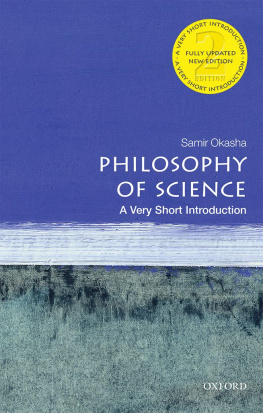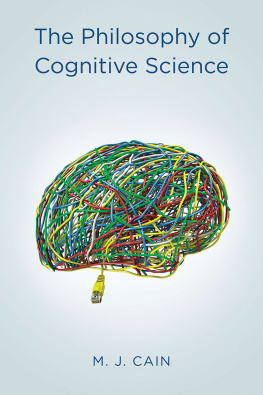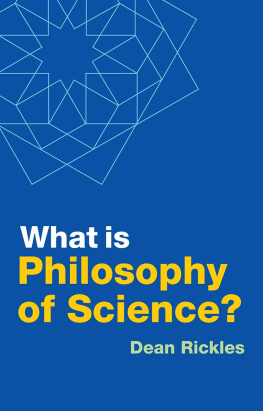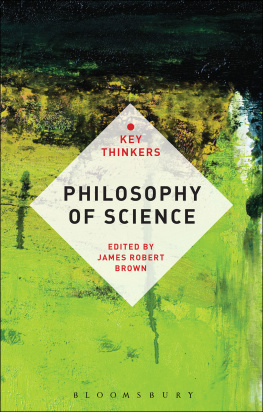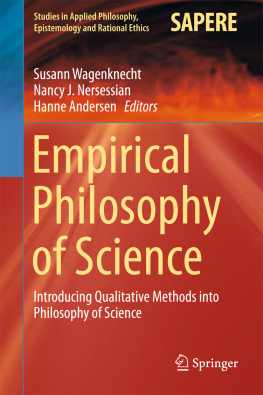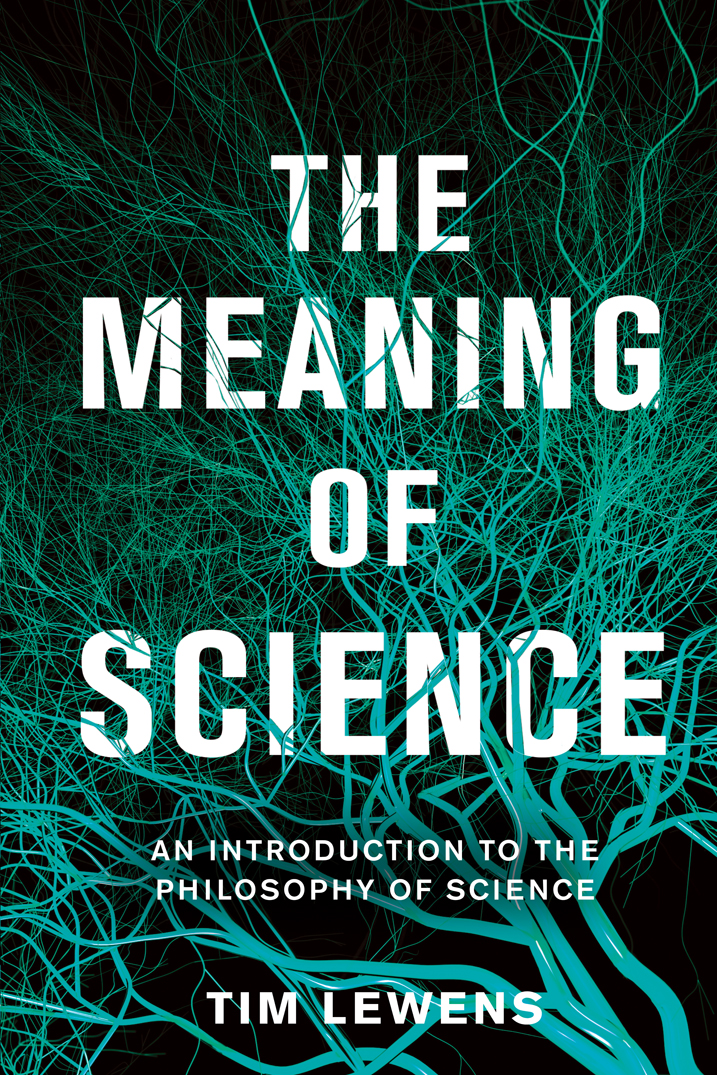
ALSO BY TIM LEWENS
The Biological Foundations of Bioethics
Cultural Evolution
Darwin
Organisms and Artifacts
Risk

Copyright 2016 by Timothy Lewens
Published in Great Britain by Allen Lane, The Penguin Press
Published in the United States by Basic Books,
A Member of the Perseus Books Group
All rights reserved. Printed in the United States of America. No part of this book may be reproduced in any manner whatsoever without written permission except in the case of brief quotations embodied in critical articles and reviews. For information, contact Basic Books, 250 West 57th Street, New York, NY 10107.
Books published by Basic Books are available at special discounts for bulk purchases in the United States by corporations, institutions, and other organizations. For more information, please contact the Special Markets Department at the Perseus Books Group, 2300 Chestnut Street, Suite 200, Philadelphia, PA 19103, or call (800) 810-4145, ext. 5000, or e-mail special..
Designed by Jeff Williams
Library of Congress Cataloging-in-Publication Data
Names: Lewens, Tim.
Title: The meaning of science: an introduction to the philosophy of science / Tim Lewens.
Description: New York: Basic Books, [2015] | Includes bibliographical references and index.
Identifiers: LCCN 2015039234 | ISBN 9780465097494 (e-book)
Subjects: LCSH: SciencePhilosophy.
Classification: LCC Q175 .L477 2015 | DDC 501--dc23 LC record available at http://lccn.loc.gov/2015039234
10 9 8 7 6 5 4 3 2 1
For Rose and Sam
Table of Contents
Guide
Contents
My first debt is to Laura Stickney at Penguin, who was kind enough to ask me to write this book. She has been an enthusiastic and patient editor, with a gratifyingly delicate touch. I also owe thanks to many colleagues and friends. Anna Alexandrova, Riana Betzler, Adrian Boutel, Andrew Buskell, Christopher Clarke, Chris Edgoose, Beth Hannon, Stephen John, and Huw Price all read the draft manuscript in its entirety. My wife Emma Gilbys comments were especially valuable, and Im otherwise indebted to her for innumerable reasons. For advice on individual chapters and shorter sections Im grateful to Jonathan Birch, Hasok Chang, Helen Curry, Dan Dennett, Jeremy Howick, Nick Jardine, Lisa Lloyd, Aaron Schurger, and Charissa Varma. For other forms of education, support, and encouragement I would like to thank Tamara Hug, Christina McLeish, Helen Macdonald, Hugh Mellor, Louisa Russell, and David Thompson.
Im indebted to the University of Cambridge and to Clare College for allowing me time to write this book, to my new colleagues at the Centre for Research in the Arts, Social Sciences, and Humanities (especially Simon Goldhill and Catherine Hurley) for providing an exciting environment in which to finish the book, and to the European Research Council (grant number 284123) for funding much of the research that contributed to it. I must also thank the many students I have worked with at Cambridge, and who have made me think hard about what the philosophy of science is, and why it matters. In putting together a book that aims to introduce people to this subject, I have found myself thinking again about Peter Lipton, an exemplary teacher and a friend I still miss.
This book is dedicated to my children, Rose and Sam. I couldnt honestly say that without them the book wouldnt have been possible. But it would have been different, it would probably have been worse, and I wouldnt have enjoyed writing it half as much.
The chapters in this book are all more or less self-contained, so they can be read in any order. Each one finishes with a short guide to further reading, which picks out some accessible books for those who wish to find out more about the topics discussed. Most readers can safely ignore the books many endnotes. They indicate the sources for the facts, arguments, and claims mentioned in the main text.
The achievements of the sciences are extraordinary. They have produced explanations for everything from the origins of human culture to the mechanisms of insect navigation, from the formation of black holes to the workings of black markets. They have illuminated our moral judgments and our aesthetic sensibilities. Their gaze has fallen on the universes most fundamental constituents and its very first moments. They have witnessed our intimate private activities and our collective public behaviors. Their methods are so compelling that they can command consensus even when dealing with events that are invisible or intangible, in the distant past or the distant future. Because of this, the sciences have alerted us to some of the most pressing problems facing humanity, and the sciences will need to play central roles if these problems are to be solved.
This bookan introduction to the philosophy of sciencesteps back from the particular achievements of the sciences to ask a series of questions about the broad significance of scientific work. It is a book for anyone with an interest in what we mean by science, and in what science means for us. It does not assume any scientific knowledge, nor does it assume any familiarity with philosophy.
The philosophy of science, like all branches of philosophy, has existed since the time of the ancient Greeks. And like all branches of philosophy, it has a mixed reputation. The charismatic American physicist Richard Feynmana recipient of the Nobel Prize for physics in 1965had little patience for the subject, allegedly remarking that philosophy of science is about as useful to scientists as ornithology is to birds.
Feynmans wordsassuming he really said themwere ill chosen. Ornithology is useless to birds because birds cannot understand it. If a bird could only learn what ornithologists know about how to recognize a cuckoo chick in its brood, then that bird could save itself a lot of misguided effort. Of course, Feynman didnt mean to suggest that philosophy was too complicated for scientists to comprehend; he just didnt see any evidence that philosophy could contribute to scientific work.
There are many good ways to respond to this challenge. One comes from a physicist whose stature is even greater than Feynmans. In 1944, Robert Thornton, freshly qualified with a PhD in the philosophy of science, began teaching modern physics to students at the University of Puerto Rico. He wrote to Albert Einstein for advice. Should he introduce philosophy into his physics course? Einstein wrote back with an unequivocal yes. So many people today, he complained, and even professional scientistsseem to me like somebody who has seen thousands of trees but has never seen a forest. Einstein went on to describe the antidote to this myopia:
A knowledge of the historic and philosophical background gives that kind of independence from prejudices of his generation from which most scientists are suffering. This independence created by philosophical insight isin my opinionthe mark of distinction between a mere artisan or specialist and a real seeker after truth.
For Einstein, the value of the philosophy of science, in combination with the history of science, lay in its ability to liberate the investigators imagination.
We will see in this book that the sciences have been admirably ambitious in bringing their methods to some of the most profound topics the world presents us with. Psychologists, evolutionists, and neuroscientists have grappled, for example, with the nature of ethics and the reality of free choice. Once they venture down these investigative pathways, it is impossible for them to avoid engagement with philosophy. Scientists cannot make plausible pronouncements about the repercussions of evolutionary theorizing for human morality, they cannot assess the fate of free will in the face of work in neuroscience, unless they have well-formulated views about what morality, or freedom of the will, involve. In other words, whether they like it or not, scientists end up running into exactly the same conceptual issues that have puzzled philosophers for centuries.



